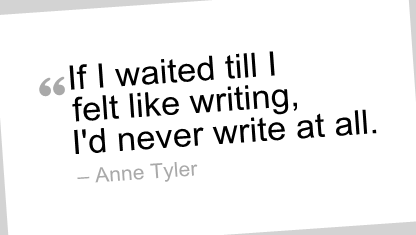For me, the need to write has always had a face.
Whose face that is and what expression it wears varies. Typically, it's been the face of a writing professor that's haunted me during those long middle-of-the-night writing sessions. It doesn't matter how fair or kind the professor is; for some reason (maybe it's the dark and caffeine jitters), my imagination paints them with a steady frown, causing my stomach to knot over every word with the thought that they might be unamused by my metaphors. Other times, the face has been warmer -- that of a close friend, perhaps -- but with eyes sad and disappointed as they strain to find some value in my work. More recently, the face has been the loved one abroad, patient and smiling; it invokes a twinge of pain in me as I remember my promise to write novels in his absence, while his cheerful voice says, "It's okay, don't feel too bad about it."
There has always been a sense of guilt associated with my work, and that guilt has always felt personal because I've associated it with important people in my life. It's not that uncommon of a trait among overachievers, I suppose. How often have we psychoanalyzed the artist driven by a neurotic need to please an ever-dissatisfied parent or mentor, even years after the latter's demise? Whether it is for God or husband or mommy dearest, history is full of creators desperately striving to impress someone.
Why? Isn't love of the art enough?
For my part, guilt in its worst moments has caused the writing process to be miserable. Mainly because those disappointed faces in my mind are entirely fictitious, not at all founded upon reality. I'm naturally self-critical to begin with, and for some reason or another I often project that criticism onto others. Even if any of the people whose faces I see tell me my work is fine, a small corner of my subconscious doesn't believe them, doesn't want to believe they're being honest in their praise. There's a fine line between constructive encouragement and being too nice, and I'll be damned if I can tell the difference.
But whether those frowns are fabricated or not, my fear of disappointing others says something interesting about the writing process, I think. I would like to believe that love of writing could be its own motivator, but for me it isn't so. Even as one who thrives on solitude, I find myself needing others in my writing -- for validation, for support. Call it insecurity (and I'm sure it is, partly), but I suspect that it has more to do with empathy. While "writing for the self" is a popular trend these days, and valid in its own right, I think it fails to see what makes great literature great: its ability to evoke something in another person, to touch something deep in his roots and make him see a commonality between himself and a stranger on a page. Writing gives the guise of speaking as an individual, when in reality it speaks of humanity.
While I have no grand illusions about inspiring millions, I can't bring myself to pull the "misunderstood writer" card and write without any regard to what others think. It goes against what has impacted me as a reader, and consequently what I can only hope to achieve as a writer: if what I write doesn't inspire, if it doesn't resonate with someone, I have failed.
But I know I don't have to please everyone, nor do I want to. In his part-memoir, part-advice book On Writing, Stephen King explains that "you can't let the whole world into your story," but you can -- and should -- let in those who matter most. According to King, every good writer must have an Ideal Reader (I.R., for short); someone for whom you write, someone who, in flesh or in spirit, is always "going to be in your writing room." As King points out, sometimes a writer's Ideal Reader (like the neurotic patient's mommy dearest) is miles away or many years dead. It doesn't matter. An I.R. gives the writer a tangible audience, a direction for the writing process; someone who the writer wants to make think, laugh, cry, and feel deeply. "And you know what?" King adds. "You'll find yourself bending the story [for them] even before the Ideal Reader glimpses so much as the first sentence."[sic!]
It takes a certain empathy to write with another person in mind, and to know that person well enough (at least, to think one does) to impact them. And that's marvelous, because empathy -- seeing and valuing each other's common humanity -- is what writing's all about, isn't it?
As for myself, I've found that guilt is not such a terrible thing to live with after all. That fear of disappointing my reader is what forces me to analyze my own work critically; it makes me take a second, third, and fourth look at everything, asking myself, "Is there anything else I can do to improve this part?" Having someone else in mind, moreover, often gives me a reason to write on my darkest days. As a naturally self-deprecating self-critic, I find it easy to conclude on a bad day that I'm not worth the time or effort to write. But, because I'm a compassion-driven person, someone else is always worth the work.
So, in spite of its bad rap, I don't mind living with guilt. If a visitation from a frowning face is what produces the work, so be it. Maybe, someday, I'll finally make that face smile.
Emma Moser
Website: antiquedwriter.blogspot.com
Twitter @em_mo_write ♦
Facebook.com/antiquedwriter










